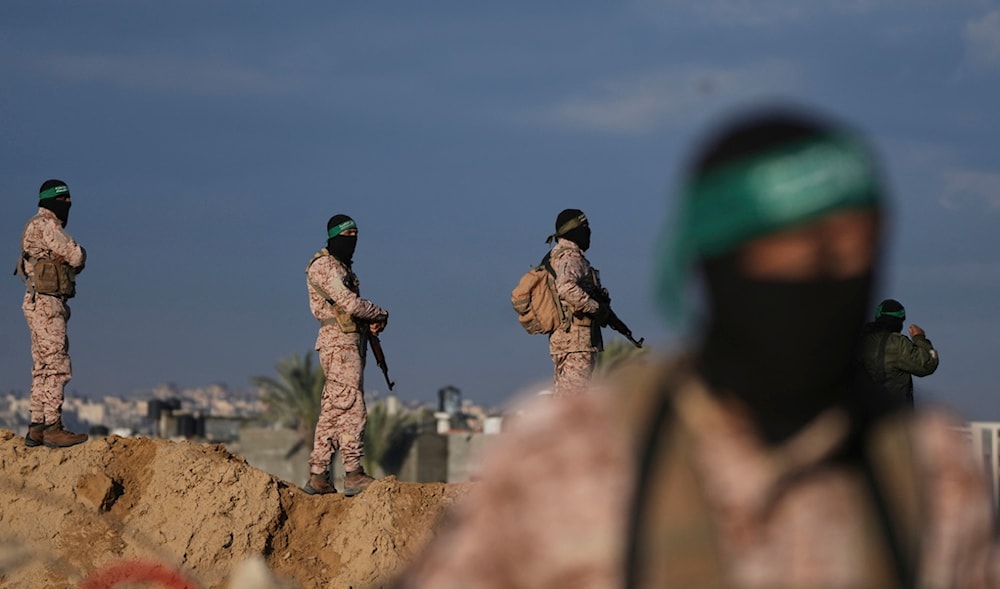Oct 7 probe a 'severe underestimation of the enemy': Israeli media
Ron Ben-Yishai reflects on the occupation's investigation into the October 7 operation, asserting that the failures to confront the unfolding events stemmed from miscalculations and misjudgments by the security establishment.
-

Hamas fighters take up positions ahead of the release of a captive as he is being handed over to the Red Cross in Khan Younis, southern Gaza Strip, on February 1, 2025. (AP)
Israeli air defenses have shown "absolute blindness, arrogance, and an underestimation of the enemy," after the October 7 operation, carried out by the Palestinian Resistance, Yedioth Ahronoth's military analyst Ron Ben-Yishai stated.
In a recent op-ed, Ben-Yishai cited an investigation revealing that the Israeli Security Ministry in Kirya did not recognize where the attack was coming from, rather believing "Israel" was experiencing a multi-front operation. Therefore, most warplanes were sent to the occupied north to protect sensitive sites.
The occupied south, on the other hand, was exposed after the security officials failed to assess the situation, thereby instructing warplanes not to attack settlements and sites, he added.
Furthermore, the investigation, which includes over a thousand pages of findings, indicated that the air defenses "were at full efficiency during the first few minutes of the attack."
According to Ben-Yishai, the preceding political dispute, in which reserve pilots were involved, did not impact the Air Force's activity. "The failure stemmed from a different place," he stated.
"The primary failure that prevented the Air Force from fully deploying its capabilities in the early hours of the attack was the flawed assessment of the threat by the Military Intelligence Directorate (Aman) and the internal security agency [Shin Bet], as well as the Air Force’s inadequate preparedness for the required state of alert," according to Ben-Yishai.
This miscalculation, he added, was "the root of the overall failure at the political level, within the army, and across the entire security establishment in Israel." These failures, as reported by Yedioth Ahronoth, reflect "arrogance, overconfidence, and underestimation of the enemy, along with an unnecessary obsession with internal politics."
'Israel's' 'scathing' investigation
In light of this, the newspaper’s military analyst described the Air Force’s investigation into the October 7 operation as "a scathing document," noting that it raises many costly lessons for the future.
Regarding these lessons, the Israeli military analyst stated that "new alert protocols must be established, pilots should be given greater operational freedom, the stockpiles of the Iron Dome and Arrow missile defense systems must be doubled, and several light aircraft equipped with machine guns should be purchased."
Ben-Yishai added that the Air Force was already working on expanding the deployment of its aircraft in border protection operations as a result of the investigation’s findings, clarifying that these measures would require additional manpower, a larger budget, and extensive resources, all of which come at a high financial cost.
As for the remaining details, they will be outlined in the Israeli military's investigation, set to be published in the coming weeks, and in the report of an official inquiry committee—"if one is ever established," Ben-Yishai remarked.
This comes as the Israeli leadership refuses to initiate an inquiry into the October 7 events, despite mounting pressure from opposition leaders, captives' families, and international observers. A cabinet meeting on Sunday, convened in response to a Supreme Court mandate, ended without action, fueling accusations that Prime Minister Benjamin Netanyahu is obstructing efforts to investigate his government's failures.
Read more: IOF ignored intel of threats before Oct.7: Israeli media

 3 Min Read
3 Min Read








